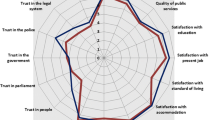Abstract
This article presents a completely novel and innovative approach for quality of life evaluation—the usage of expert systems. The use of an expert system to evaluate the degree of quality of life is a research project, based entirely on a qualitative method, which aims at helping in understanding of how in an era of great changes residents from different countries live and work in diverse economic organizations, and how they would rate their work and life. In this article the architectural framework of an expert system in the social area domain is presented; the design and the development process of the system are also described. The designed system is intended for the evaluation of quality of life. The development of expert system for quality of life evaluation is a new information technology derived from artificial intelligent research. The novel expert system contains knowledge about sets of factors and indicators, which may be used for quality of life measure (equal protection by the law; freedom from discrimination; right to be treated equally without regard to gender, race, language, religion, political beliefs; and etc.) and works with them. The knowledge for the expert system was acquired from domain experts, texts, and other related sources. The tasks of the presented expert system are: to interact, to access knowledge, to make logical decisions, to result in conclusions, and to interpret its conclusions.







Similar content being viewed by others
References
Alber, J., & Fahey, T. (2004). Perceptions of living conditions in an enlarged Europe, European foundation for the improvement of living and working conditions. Luxembourg: Office for Official Publications of the European Communities.
Alesina, A., & La Ferrara, E. (2002). Who trusts others? Journal of Public Economics 85, 207–234. www.elsevier.com/locate/econbase.
Atanasova, I. (2014). Practical aspects of quality data processing and a rule-based expert system for quality of life evaluation. Network Intelligence Studies, II(2(4)), 153–160.
Atanasova, I. (2015). On design and development of QLIFEX: An expert system for social area. International Journal of Applied Behavioral Economics (IJABE), 4(II), 16–35. (ISSN 2160–9802).
Atanasova, I., & Krupka, J. (2013). Architecture and design of expert system for quality of life evaluation. Informatica Economica Journal, 17(3), Romania, The online version: http://www.revistaie.ase.ro/current.html. Accessed Sep 2013.
Carley, K. (2012). Formalizing the social expert’s knowledge. Carnegie-Mellon University. Sociological Methods Research, November 1988, 17(2), 165–232. http://smr.sagepub.com/content/17/2/165.abstract. doi: 10.1177/0049124188017002003.
CLIPS. (2012). http://www.jsc.nasa.gov/clips/CLIPS.html. Accessed Dec 2012.
CLIPS Documentation. (2012). http://www.ghg.net/clips/download/documentation/. Accessed Dec 2012.
Eurofound. (2013). European foundation for the improvement of living and working conditions, 2012, Annual work programme 2012. http://www.eurofound.europa.eu/pubdocs/2012/03/en/1/EF1203EN.pdf.
Eurofound (project no. 0272). (2013). European foundation for the improvement of living and working conditions, European survey on working time and work-life balance. http://www.eurofound.europa.eu/areas/worklifebalance/eswt.htm.
Eurofound (project no. 0310). (2013). European foundation for the improvement of living and working conditions, integration of migrants and access to social rights: role of local authorities. http://www.eurofound.europa.eu/areas/worklifebalance/eswt.htm.
European Commission. (2002). The life of women and men in Europe: A statistical portrait, data 1980–2000, Eurostat. Theme 3. Population and social conditions, Luxembourg, Office for Official Publications of the European Communities.
European Parliament. (2004). Report on reconciling professional, family and private lives, Brussels: Committee on women’s rights and equal opportunities (A5-0092/2004).
Ferrell, B. (1995). The impact of pain on quality of life. A decade of research. The Nursing Clinics of North America, 30(4), 609.
Kasparova, M., Krupka, J., & Jirava, P. (2009). Approaches to air quality assessment in locality of the Pardubice Region. In Book of proceedings of the 5th international conference EMAN 2009.
Kelly, M. J. (1994). Teaching applications of expert systems. Journal of Teaching in Social Work, 9(1–2), 37–47.
Křupka, J., Mandys, J., Svobodová, J., Augustinová, M. (2011). Modelling of sustainable systems. Scientific papers of the University of Pardubice, Series D, Faculty of Economics and Administration No. 19 (1/2011), vol. XVI, pp. 102–114.
Oort, F. (1994). Using structural equation modeling to detect response shifts and true change. Quality of Life Research, 14(3), 587–598.
Rocke, C., & Lachman, M. E. (2008). Perceived trajectories of life satisfaction across past, present, and future: Profiles and correlates of subjective change in young, middle-aged, and older adults. Psychology and Aging 23(4), 833–847. Copyright 2008 by the American Psychological Association.
Schoech, D. (1985). Artificial intelligence for professional decisions. Computers in Human Services, 1(1), 81–115.
Schuerman, J. R. (1987). Social work. Research Abstracts, 23(3), 14–18. doi:10.1093/swra/23.3.14.
Systém monitorování zdravotního stavu obyvatelstva České republiky ve vztahu k životnímu prostředí [online]. 2009 [cit. 2010-03-06]. www: http://www.szu.cz/uploads/documents/chzp/souhrnna_zprava/Szu_09_1_.pdf.
Turban, E. (1992). Expert systems and applied artificial intelligence. New York: MacMillan.
Vliv změn světa práce na kvalitu života [online]. 2006 [cit. 2010-02-09]. http://kvalitazivota.vubp.cz/prispevky/svet_prace.pdf.
WHO. (2013). World Health Organization. http://www.who.int/en/.
Acknowledgments
This work was supported by the Project No. CZ.1.07/2.3.00/30.0021—‘Enhancement of R&D Pools of Excellence at the University of Pardubice’, Ministry of Education, Youth and Sports of the Czech Republic and European Social Fund.
Author information
Authors and Affiliations
Corresponding author
Rights and permissions
About this article
Cite this article
Atanasova, I., Karashtranova, E. A Novel Approach for Quality of Life Evaluation: Rule-Based Expert System. Soc Indic Res 128, 709–722 (2016). https://doi.org/10.1007/s11205-015-1052-0
Accepted:
Published:
Issue Date:
DOI: https://doi.org/10.1007/s11205-015-1052-0




